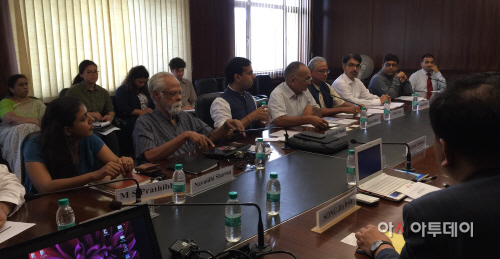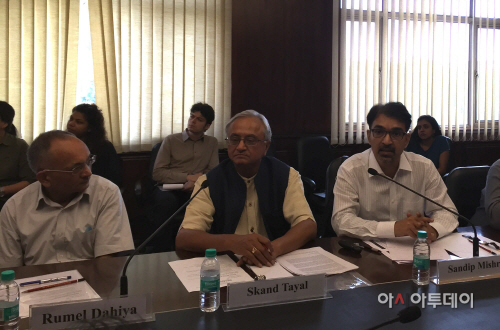S. Korea should utilize India's connection with North Korea and other countries with mutual relations with both Koreas, pointed out experts from India.
 The Indian delegation listening to Brig Rumel Dahiya, IDSA's deputy director general, at the international symposium on 'India-Korea Relations' organized by the Institute for Defense Studies and Analyses (IDSA) held on Wednesday. Nearly 30 Korea and India government officials and experts attended the symposium to discuss India's role on Korean peninsula./ Photographed by Ha Man-joo The Indian delegation listening to Brig Rumel Dahiya, IDSA's deputy director general, at the international symposium on 'India-Korea Relations' organized by the Institute for Defense Studies and Analyses (IDSA) held on Wednesday. Nearly 30 Korea and India government officials and experts attended the symposium to discuss India's role on Korean peninsula./ Photographed by Ha Man-joo |
By Ha Man-joo, India correspondent, AsiaToday - Experts claimed that the South Korean government should create a network of countries with mutual relations with both Koreas in order to manage its relation stably with North Korea and to strengthen unification diplomacy.
Dr. Sandip Mishra, professor at Delhi University, met with AsiaToday at the Institute for Defense Studies and Analyses (IDSA) in New Delhi on Wednesday and said, "The six-party talks to denuclearize North Korea hasn't been held for a long time, and inter-Korean relations are unstable." He said, "The unification diplomacy which is concentrated in the neighboring four powerful nations - China, Japan, Russia, and the United States, - often show limitations. If the Korean government creates a network of countries with mutual relations with both Koreas, such as India, Indonesia, Pakistan, and Syria, this network could play a positive role by jointly approaching inter-Korea relations and reunification issues. This will contribute in shaping the process of Korean reunification."
During the international symposium on 'India-Korea Relations' jointly organized by the Defense Ministry-run think tank IDSA and the Embassy of the Republic of Korea, Dr. Mishra said, "Since 1973, India has been maintaining its diplomatic ties with both South and North Korea. South Korea should utilize India's connections with North Korea as another channel for inter-Korean dialogue. India is ready to play a role that can reach out to both Koreas at the same time."
 Dr. Sandip Mishra (right), professor at Delhi University, gives a presentation on 'India and South-North Korea Relations' at the international symposium on 'India-Korea Relations' held at the Institute for Defense Studies and Analyses (IDSA) on Wednesday. In the middle is Skand R. Tayal, Vice President of India-Republic of Korea Friendship Society and also the former Ambassador of India to South Korea, and at the left side is Brig Rumel Dahiya, Deputy Director General of the IDSA./ Photographed by Ha Man-joo Dr. Sandip Mishra (right), professor at Delhi University, gives a presentation on 'India and South-North Korea Relations' at the international symposium on 'India-Korea Relations' held at the Institute for Defense Studies and Analyses (IDSA) on Wednesday. In the middle is Skand R. Tayal, Vice President of India-Republic of Korea Friendship Society and also the former Ambassador of India to South Korea, and at the left side is Brig Rumel Dahiya, Deputy Director General of the IDSA./ Photographed by Ha Man-joo |
Indian scholars who attended the symposium also stressed the role of India towards North Korea. Their claim is quite persuasive as recently there has been active exchange between the Indian government and North Korea's Foreign Office. North Korean Foreign Minister Ri Su-yong had visited India last April, and Indian Minister for Home Affairs Kiren Rijiju visited the North Korean Embassy earlier this month to participate in an event marking the North Korean national Independence Day.
Brig Rumel Dahiya, Deputy Director General of the IDSA, said, "There might be a limited role for India on North Korea issues." But he said, "India has been providing humanitarian support to North Korea, which allows the country to persuade about the value of democracy, human dignity, and more. India's diplomatic ties with North Korea is to help the country to be a part of world citizens."
Dr. G. Balachandran, Consulting Fellow at the IDSA, said, "India's ambassador in North Korea meets with North Korean officials frequently. Besides, there are several North Korean elites who studied in India with scholarships from the Indian government. Since India is not a military ally of the United States, North Korea trusts Indian ambassador more than other ambassadors in North Korea. So the ambassador will be able to play a part in inter-Korean issues."
Dr. Yoo Ho-yeol, professor of North Korean Studies at Korea University, said "We have been focusing on four-power diplomacy and six-party talks, but if a major country like India takes a new role, our unification diplomacy can have an ally and an alternative." He stressed India' role as a balancer in the Asia-Pacific region, stating, "While China emerges as a powerful nation in Asia, India can take a role of balancing the region in connection with the United States and Japan. Balancing of power helps to stabilize Korean Peninsula's situation."
Dr. Han Dong-ho, Research Fellow at the Korea Institute for National Unification, said, "Considering the potential of India, its role for the unification issue will be a huge one.
Most Read
-
1
-
2
-
3
-
4
-
5
-
6
-
7





















